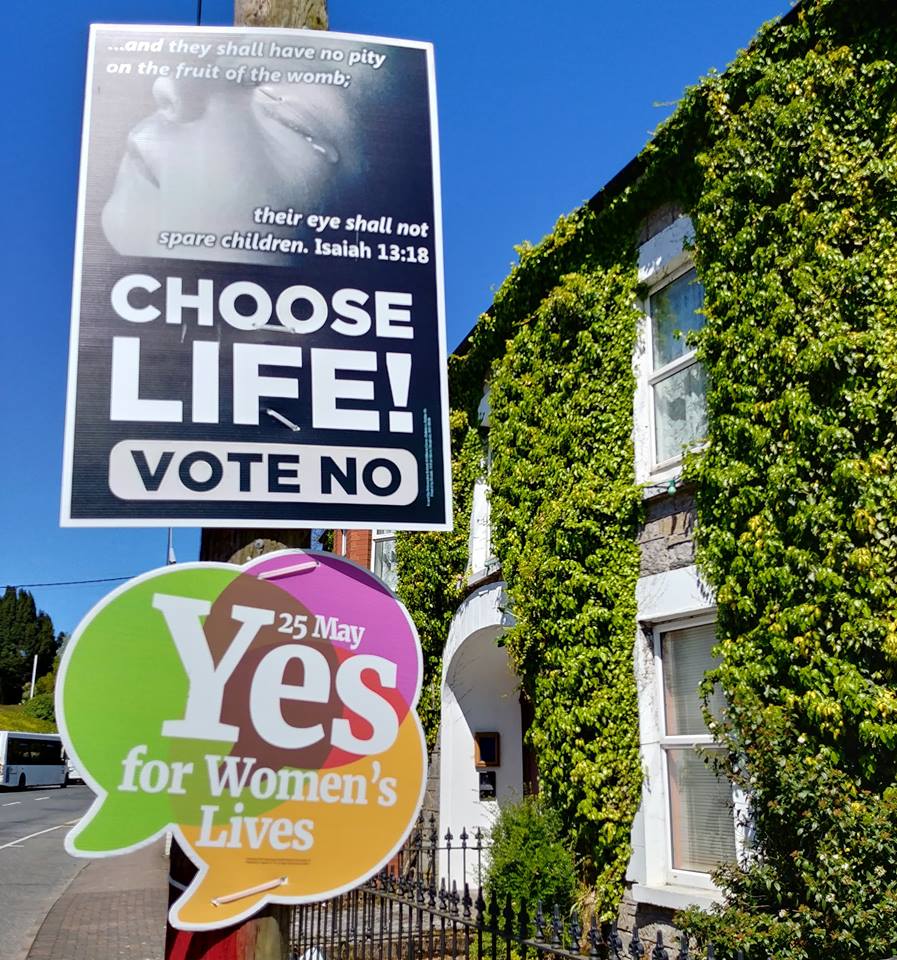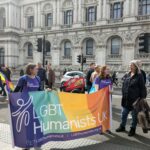Blog Post
Ireland’s Protestants and Catholics unite against abortion
By Jonathon Van Maren
After a long week of hard campaigning, we headed to Belfast for the weekend for church. Northern Ireland—as we crossed the nearly indiscernible border, the sign that was supposed to announce the entrance into a different country had been vandalized to read “One Ireland” instead—is as beautiful as the Republic, with the only readily noticeable difference being the Union Jack instead of the Irish tri-color. That, and suddenly the omnipresent signs advertising the abortion referendum abruptly disappeared. The citizens of Northern Ireland cannot vote in the referendum. We passed the Bronte Homeland, where the father of the genius trio Emilie, Anne, and Charlotte had grown up, and discovered that Belfast also claimed the great C.S. Lewis as their hometown son.
Despite the peaceful pastoral landscape and beautiful city, of course, Belfast and the surrounding areas were riven by periodic violence throughout the decades between the late 1960s and the Good Friday agreement of 1998, that period now simply known as “the Troubles.” While traveling with Irish pro-lifers, those events come up often—one recalled a distant relative who had apparently dropped bombs on a police station from a helicopter, and another told the story of a family member who had his ambulance used to smuggle weapons for the IRA unbeknownst to him. On a single street, we saw a pub—the Rose and Crown—that had been blown up in 1974, killing six people, and the site of a shooting in 1992 only a few yards away. A memorial marked the spot, listing the names of the victims and commemorating those “Murdered for their faith.” The impact of these events is still felt today. “Bullets do not only travel distance,” read the plaque, “but also through time.”
Interestingly, the abortion issue has created some strange alliances. Despite the enormous Peace Wall and dozens of other walls like it, splitting the Protestant neighborhoods from the Catholic ones, one pro-lifer from Northern Ireland who had been campaigning for Save the 8th in the Republic for weeks told us that although he was Catholic, in recent years he’d found himself voting for Unionist—Protestant—politicians, something that would have been unheard of only a short while ago. The so-called Catholic politicians, he said, were going weak on abortion, which was the most important issue to him, and so he had to vote for the most pro-life politicians on the ballot. Another pro-life volunteer explained that the religious element of the nationalist standoffs of the past several decades had caused many of the Protestants to cling harder to their faith and to beliefs in the sanctity of life that are falling by the wayside in other Western countries. Just as alliances are forming between Catholics and conservative Protestants over fundamental social issues in the United States, Canada, and elsewhere, even in Ireland these issues can bridge age-old divides—while deepening others.
Many in Northern Ireland are extremely worried about the outcome of the abortion referendum in the Republic. The pastor at the Reformed Presbyterian church we attended in Belfast mentioned it several times, prayed about it, and then reminded his congregation that there would be a day of prayer at the church on the day of the referendum, where they would be gathering to pray for a “No” vote from 8 AM until 8 PM. “Even if you can only drop by for a short time, please do come,” he urged them. One young woman sitting in front of me told me that her aunt had been in the Republic campaigning for quite some time, and was currently canvassing in Donegal. Abortion is still illegal in Northern Ireland, but if the Republic decides to legalize it, suddenly women would have an easy way to get abortions—instead of “going to England,” they could simply drive across the soft border to a facility in the Republic. This is one of the reasons that clergymen—both Protestant and Catholic—have been urging their parishioners across Northern Ireland to take to their knees and vote with their prayers.
On the way to Dublin Monday morning to begin canvassing, we stopped for a few minutes at the ruins of an abbey atop the Hill of Slane, where St. Patrick of Ireland lit a fire in 433 to celebrate Easter in defiance of a nearby pagan king. The resulting confrontation resulted in the conversion of the local druid, and one of the first major Celtic conversions to Christianity. Patrick is revered and treasured by both Protestants and Catholics in Ireland, part of their collective heritage. Ireland’s children are also precious, and Catholics and Protestants across the nation realize that their collective future depends on keeping the bloody abortion business from their shores. They fight side by side in this battle with determination, which reminded me of the slogan printed on the shirt of one of the pro-life campaigners: “Our revenge will be the laughter of our children, not their slaughter.”
_____________________________________________________
For anyone interested, my book on The Culture War, which analyzes the journey our culture has taken from the way it was to the way it is and examines the Sexual Revolution, hook-up culture, the rise of the porn plague, abortion, commodity culture, euthanasia, and the gay rights movement, is available for sale here.








